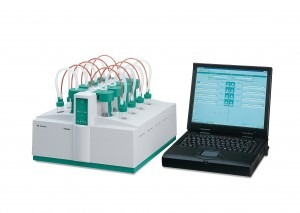
The Metrohm 763 Thermomat is a dedicated instrument for determining the thermal stability of PVC and uses conductivity for the detection of HCI gases.
Applications include determination of PVC stability times (raw PVC and PVC products) and examination of PVC additives (stabilisers and plasticisers).
Comparison of pH and conductivity measurement as per Metrohm Stability Application Work CH7-0137-102002 pH and conductivity-measurement methods for the determination of thermal stability of PVC pellets and pieces were compared, showing that the evaluated stability times for both methods are equal.
The thermal stability of PVC was determined under identical conditions according to ISO 182-2 (pH method) and ISO 182-3 (conductivity method).
In contrast, the induction time determined with the pH method is significantly shorter than the one found by conductivity.
The discrepancy can be explained by the difference in the data presentation, logarithmic scaling for the pH and linear for conductivity.
If the pH is converted into H+ concentration the obtained induction times are comparable.
Since ISO 182-2 only specifies the determination of the stability time, there is no restriction to use the 763 PVC Thermomat for the determination of the thermal stability of PVC according to ISO standards.
The 763 PVC Thermomat, a fully PC-controlled instrument for the determination of the thermal stability of PVC plastics, features data storage and archiving into a database as well as automatic evaluation of the curves.
Two heating blocks allow users to analyse eight samples at one or two different temperatures.
Users can increase analysis capacity to 32 samples at up to eight different temperatures by connecting up to four PVC Thermomats to a PC.
The Windows-based software makes operating the Thermomat quick and easy, with control and management of each individual sample and heating block.
With the 763 PVC Thermomat, the determination of the thermal stability of PVC-type polymers is said to take place at a highly sophisticated level.
With the disposable sample-reaction vessels, the cleaning procedure is minimised.
Determination of the thermal stability of PVC-chlorinated plastics is a three-step process.
PVC decomposes at elevated temperatures and releases gaseous HCl.
The gaseous HCl is then moved by a stream of inert nitrogen into the measuring cell filled with distilled water.
The thermal stability of the PVC materials is determined by measuring the conductivity of the aqueous HCI solution.
Applications include: quality control in PVC industry; determination of PVC stability times of PVC resin, blended PVC and PVC products; examination of PVC additives (stabilisers, plasticisers).
Features include: two heating blocks per Thermomat allows eight sample measurements at two different temperatures; connect up to four Thermomats per PC - increase analysis to up to 32 samples at up to eight different temperatures; fully PC-controlled; temperature range of 50 to 220C; individual start of each channel; disposable reaction vessels; database archive with sorting, filtering and data export; automatic evaluation with additional, computer-supported manual evaluation using the tangent method; and temperature extrapolation: conversion of the results to other temperatures.
The 763 PVC Thermomat meets the following standards: certified GLP set for exact calibration of the instrument: National and international standards DIN 53381 part 1: Determination of the thermostability of PVC DIN VDE 0472 part 614: Examination of insulated cables - thermostability ISO 182-3: Plastics - Determination of the tendency of PVC-based polymers to evolve HCl at elevated temperatures - part 3: conductometric method





